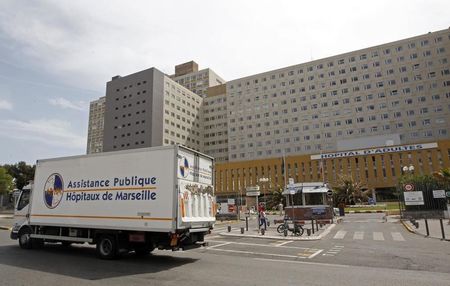By Leigh Thomas
PARIS (Reuters) - French business activity slowed again in September amid weakness in the key service sector, two surveys showed on Tuesday, as the euro zone's second-biggest economy posted zero growth for the second quarter in a row.
In the face of weak demand, companies are proving reluctant to heed the call of President Francois Hollande's government to drive a recovery with investment as pledges to cut their payroll tax do little to revive their confidence.
Data compiler Markit said its preliminary composite purchasing managers index, covering activity in the services and manufacturing sectors which make up around two-thirds of the economy, eased to 49.1 this month from 49.5 in August.
That marked the weakest level of activity in three months and brought the index further below the 50 point line that separates expansions in activity from contractions.
With the European Central Bank struggling to revive euro zone demand through cheap credit, there were few prospects for any immediate improvement in French growth, Markit chief economist Chris Williamson said.
"The overall picture for France when you put this all together is another quarter of stagnation at best," he told Reuters, adding that government spending was the only thing that was preventing an outright contraction.
A breakdown showed activity in the services sector - which by itself makes up 56 percent of the economy - fell short of expectations while the manufacturing sector saw its index decline less than expected.
In the face of weak demand, French firms continued to cut prices as they fought to win new business, which will keep inflation pressures muted.
A separate survey from the INSEE official statistics agency said business confidence slipped to its lowest level since August 2013. It found sentiment in the industrial sector was stable but fell in services to its lowest level since May.
In the latest manifestation of flagging demand, French tyre maker Michelin (PA:MICP) warned it may miss its sales growth target this year because of weak markets in Europe and Brazil.
INSEE said on Tuesday the economy posted zero growth in the second quarter after it already stalled in the first three months of the year, confirming a preliminary estimate.
According to the report, corporate profit margins as a share of value added fell to 29.3 percent, the lowest level since late 1985 despite measures to ease their tax burden.
The government is phasing out 30 billion euros (23.56 billion pounds) in payroll taxes paid by companies over three years as part of a drive to restore their competitiveness on condition they hire and invest.

INSEE's figures showed that firms continued to cut investment, which fell 0.7 percent in the second quarter in the biggest drop since the 2008-2009 financial crisis.
(Reporting by Leigh Thomas; Editing by Dominic Evans)
